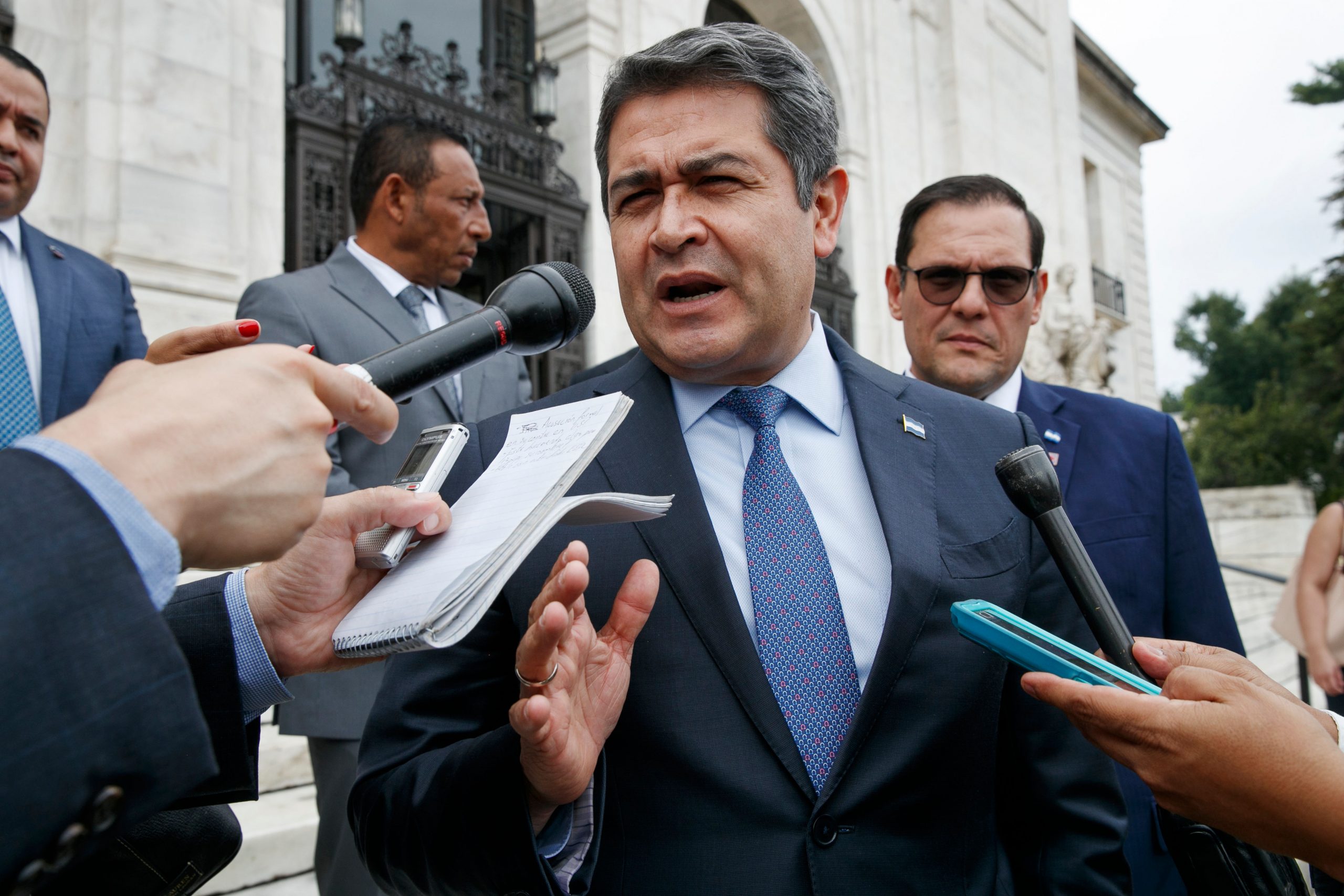After years of speculation in Honduras, the United
States formally requested the arrest and extradition of former President Juan
Orlando Hernández less than three weeks after he left office.
Also Read: CDC says COVID vaccination for children below 5 to begin soon in US
Honduran security forces surrounded Hernández’s
neighbourhood Monday night and the Supreme Court of Justice scheduled an urgent
meeting Tuesday morning to select a judge to handle the extradition request. A
standoff ensued.
In a video released by Hernández’s legal team from
apparently inside his home, attorney Félix Ávila said that everything would
have to wait until the Supreme Court designated a judge Tuesday to consider the
case. “Meanwhile, it is understood that no arrest order exists.”
Also Read: Former ‘American Idol’ star Caleb Andrew Kennedy charged in fatal DUI crash
However, at a police barrier to the neighborhood,
Rasel Tomé, vice president of the newly elected National Congress, said that
Hernández had to turn himself in or he would be captured at 6 a.m. Tuesday.
Shortly before that deadline, Hernández released an
audio recording via Twitter early Tuesday thanking those praying for him.
Also Read: Climate change biggest threat, but few willing to change lifestyle: Survey
“It is not an easy moment,” he said. “I don’t desire
it for anyone.”
He said the National Police had already been informed
by his lawyers that “I am ready and prepared to cooperate and go voluntarily
with their accompaniment in the moment the judge designated by the honorable
Supreme Court of Justice decides it, to able to face this situation and defend
myself.”
Also Read: New York lifts indoor mask mandates as COVID-19 cases drop
It was a long-awaited fall for a leader reviled in his
home country, who enjoyed support from the Trump administration but had been
kept at arm’s length by a Biden White House targeting Central America’s endemic
corruption as a root cause of migration.
The specific charges Hernández’s faces are not known,
but federal prosecutors in New York had previously named him a co-conspirator
in a drug trafficking case, alleging that his political rise was fueled with
drug profits. Hernández has long denied any wrongdoing.
Also Read: Canadian provinces lift COVID restrictions, protests remain
Nicole Navas, a spokeswoman for the U.S. Department of
Justice, declined to comment.
Hernández left office on January 27 with the swearing-in of
President Xiomara Castro. The same day he was sworn in as Honduras’
representative to the Central American Parliament.
His lawyer, Hermes Ramírez, told local media his
client had immunity as a member of the regional parliament and said government
forces were not following proper procedures. He said Hernández was inside the
home.
Also Read: In pics: Medals and victories of Day 5 of Beijing Olympics 2022
Various contingents of the National Police, including
special forces, as well as military police, were present around Hernández’s
neighbourhood Monday night. Barriers at all of the entrances kept out media and
even residents.
Members of the security forces entered the area with
weapons, wearing balaclavas and with handcuffs dangling from their ballistic
vests. Some neighbours said the house had been dark and they believe unoccupied.
Also Read: Winter Olympics 2022: Snowboardcross rider Lindsey Jacobellis earns 1st US gold in Beijing
Hernández often pointed to the fact that Honduras
began allowing the extradition of Hondurans on drug trafficking charges while
he was president of the congress as part of his defence.
But U.S. prosecutors have alleged that he was taking
bribes from drug traffickers on the promise of protecting them once he was
Honduras’ president.
U.S. prosecutors in New York repeatedly implicated him
in his brother’s 2019 drug trafficking trial, alleging that his political rise
was fueled by drug profits.
Also Read: US VP Kamala Harris’ husband, Doug Emhoff, evacuated from Black history event after bomb threat
That brother, Juan Antonio “Tony” Hernández, himself a
former Honduran congressman, was sentenced to life in prison on drug and
weapons charges in March 2021. At his sentencing Assistant, U.S. Attorney
Matthew Laroche characterized the crimes as “state-sponsored drug trafficking.”
Juan Orlando Hernández took office Jan. 27, 2014.
Hernández used a friendly Supreme Court to overcome Honduras’ constitutional
ban on reelection and won a second term in 2017 in elections marred by
irregularities.
Also Read: Republicans blast Biden’s ‘racial equity’ plan to send crack pipes to drug addicts
Around midnight Monday, 56-year-old Jorge Arturo Vega,
a supporter of Castro’s Liberty and Refoundation Party, stood outside a police
barricade at Hernández’s neighbourhood celebrating.
“This is a party we’ve been waiting a long time for,”
Vega said, thinking back over the dozen years since Hernández came up in the
congress. “We couldn’t stand this his drug trafficker, criminal, killer in the
presidential house any longer.”







